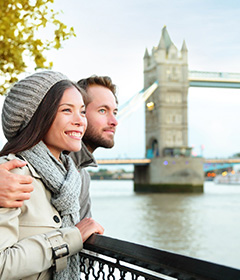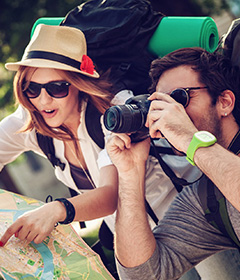Embarking on a journey with loved ones can be an exhilarating experience, but the dynamics of travelling with a romantic partner versus a group of friends can differ significantly. Both types of travel offer unique opportunities for bonding, adventure, and personal growth. Understanding these differences can help travellers make informed decisions about their travel companions and set realistic expectations for their trips.
Psychological dynamics of couple vs. group travel
When it comes to the psychological aspects of travel, couples and friend groups face distinct challenges and rewards. Couples often experience a more intense emotional journey, as they navigate new experiences together in an intimate setting. This can lead to deeper connections and shared memories that strengthen the relationship. However, it also means that conflicts may arise more frequently and feel more personal.
On the other hand, travelling with friends typically involves a more diverse range of personalities and interests. This diversity can lead to a richer travel experience, with different perspectives and ideas contributing to the group’s activities. However, it also requires more compromise and negotiation to ensure everyone’s needs are met.
Group travel often fosters a sense of collective adventure , where shared experiences create lasting bonds between friends. Couples, meanwhile, may find that travel reveals new aspects of their partner’s personality, both positive and challenging, as they face unfamiliar situations together.
Financial implications and budgeting strategies
The financial aspects of travel can vary significantly between couple and group trips. Understanding these differences is crucial for effective planning and avoiding potential conflicts over money during the journey.
Cost-sharing models in friend groups
When travelling with friends, cost-sharing becomes a central issue. Groups often employ various methods to split expenses fairly, such as using apps to track shared costs or appointing a designated treasurer. This approach can help reduce overall expenses for individuals, as costs for accommodation and transportation are often divided among more people.
Couple-specific travel discounts and packages
Couples may benefit from specific travel deals and packages designed for two people. Many resorts and tour operators offer romantic getaways or honeymoon specials that can provide better value for couples. However, these packages may come with higher price tags compared to budget-friendly options often preferred by groups of friends.
Impact of relationship status on accommodation choices
Accommodation preferences often differ between couples and friend groups. Couples typically opt for more private, romantic settings, such as boutique hotels or intimate bed and breakfasts. Friend groups, on the other hand, may prioritise social spaces and shared facilities, making hostels or rental apartments more appealing options.
Group booking advantages for activities and tours
Larger groups of friends can often secure better rates for activities and tours through group discounts. This advantage can allow friends to experience a wider range of attractions or higher-end experiences at a lower individual cost. Couples, while missing out on these group rates, may have more flexibility in choosing personalised or intimate experiences.
Itinerary planning and decision-making processes
The approach to planning and decision-making can differ dramatically between couple and group travel. These differences can significantly impact the overall travel experience and satisfaction of all parties involved.
Consensus-building techniques for friend groups
In group travel, reaching a consensus on itinerary and activities can be challenging. Effective groups often employ techniques such as voting on major decisions or assigning different days to different members for planning. This democratic approach ensures that everyone’s preferences are considered, but it can also lead to compromises that don’t fully satisfy anyone.
Compromise strategies for couples
Couples typically have an easier time making decisions, as there are only two preferences to consider. However, this can also lead to more intense negotiations when disagreements arise. Successful couple travellers often use strategies like alternating who gets to choose activities or finding ways to incorporate both partners’ interests into each day.
Utilising travel apps for group coordination
Technology plays a crucial role in modern travel planning, especially for groups. Apps designed for collaborative planning and communication can streamline the process of organising group trips. These tools allow for shared itineraries, expense tracking, and real-time updates, making it easier for larger groups to stay coordinated.
Balancing individual preferences in shared experiences
Both couples and friend groups face the challenge of balancing individual preferences with shared experiences. Couples may find it easier to compromise , given the intimate nature of their relationship, but may also struggle with the intensity of constant companionship. Friend groups have the advantage of flexibility, with members often splitting up to pursue different activities before reconvening.
Social dynamics and interpersonal relationships
The social dynamics of travel can vary significantly between couple and group experiences. Couples often focus on strengthening their bond and creating shared memories, while friend groups navigate a more complex web of relationships and group dynamics.
In couple travel, partners may find themselves in a pressure cooker of emotions, with the intensity of shared experiences either bringing them closer together or highlighting existing tensions. This concentrated time together can lead to profound conversations and a deeper understanding of each other, but it can also magnify small irritations or differences in travel styles.
Friend group travel, conversely, often involves a more diverse social experience. Group dynamics can shift and evolve throughout the trip , with subgroups forming for different activities or shared interests. This flexibility can lead to new friendships forming within the group and allow individuals to connect with different people throughout the journey.
Travel has the power to reveal true personalities and test the strength of relationships, whether romantic or platonic.
One key difference is the level of personal space and alone time available. Couples may find it challenging to carve out individual time, while friend groups often naturally allow for more personal freedom. This distinction can be crucial for introverts or those who need time to recharge away from social interactions.
Travel experiences tailored to relationship types
The type of travel experiences sought by couples and friend groups often differ, reflecting the nature of their relationships and shared interests.
Romantic destinations vs. group-friendly locales
Couples often gravitate towards destinations known for their romantic ambiance, such as secluded beaches, picturesque cities, or intimate resorts. These locations cater to couples with special amenities and experiences designed for two. Friend groups, however, may prefer destinations that offer a wider range of activities and social opportunities, such as vibrant cities, festival locations, or adventure sports hubs.
Adventure travel dynamics: couples vs. friends
Adventure travel can take on different forms depending on the travel party. Couples might seek out challenging experiences that allow them to support and rely on each other, fostering a sense of teamwork and shared accomplishment. Friend groups may approach adventure travel with a more competitive or collaborative spirit, with different members taking the lead based on their strengths or interests.
Cultural immersion experiences for different travel parties
Cultural immersion can be approached differently by couples and friend groups. Couples might opt for more intimate cultural experiences, such as private cooking classes or guided tours, allowing for a deeper, shared understanding of the local culture. Friend groups may find themselves more readily accepted into local social scenes, participating in community events or engaging with larger groups of locals.
Solo activities within group and couple travel contexts
Even within the context of couple or group travel, opportunities for solo activities can be important. Couples may need to negotiate time for individual pursuits, which can be challenging but ultimately beneficial for the relationship. In friend groups, solo activities are often more readily accepted, with members splitting off to pursue personal interests before reconvening to share their experiences.
Post-trip reflections and impact on relationships
The aftermath of a trip can have lasting effects on relationships, whether romantic or platonic. For couples, a successful trip can strengthen their bond and create cherished memories that enhance their relationship. However, a challenging trip might bring underlying issues to the surface, prompting important conversations or realizations about compatibility.
Friend groups often find that travel experiences cement their relationships, creating shared stories and inside jokes that last long after the trip ends. The challenges faced and overcome together can strengthen the group’s bond. However, travel can also reveal incompatibilities or strains in friendships that were not apparent in day-to-day life.
Post-trip reflections often lead to valuable insights about oneself and others . Couples may discover new aspects of their partner’s personality or uncover shared values that were previously unrecognized. Friends might gain a deeper appreciation for each other’s strengths or learn to navigate differences more effectively.
The true test of any relationship often comes not during the trip itself, but in how the shared experiences are integrated into the relationship upon returning home.
Ultimately, whether travelling as a couple or with friends, the key to a successful trip lies in open communication, mutual respect, and a willingness to embrace the unexpected. By understanding the unique dynamics of each travel style, travellers can set realistic expectations and create memorable experiences that enrich their relationships long after the journey ends.


